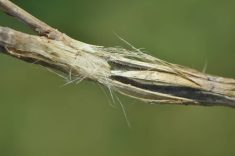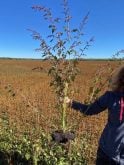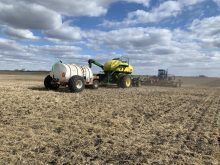Growers must keep deregistered canola varieties out of fields this spring, says Arvel Lawson, program manager for crop production with the Canola Council of Canada (CCC).
“Canada’s bulk-handl ing system for canola means that all growers play a role in keeping canola export ready,” says Lawson. “Each and every load of canola delivered to the elevator should satisfy the specifications of our key customers.”
Canada’s canola exports were valued at more than $3.1 billion last year. Growers who seed deregistered canola varieties are making a decision that puts the entire industry at risk. International trade is becoming increasingly complex and the specific requirements of Canada’s key export markets are continuously in flux. Therefore, the CCC advises that the following canola varieties should not be seeded this spring:
Read Also

Canadian canola prices hinge on rain forecast
Canola markets took a good hit during the week ending July 11, 2025, on the thought that the Canadian crop will yield well despite dry weather.
Roundup Ready Polish (B. rapa) canola: Hysyn 101 RR
Bromoxynil tolerant: 295BX, Cartier BX, Zodiac BX, Renegade BX
Liberty tolerant: Exceed, 2631 LL, Swallow, SW Legion LL, SW Flare LL, LBD 2393 LL, Innovator, Independence, HCN 14, Phoenix
Liberty Link hybrids: 3850, 2153, 3640, 3880, 2163, 2273
The recent EU approval of T45 does not mean varieties containing this event can be grown in Canada. These varieties are still deregistered.
“The approval of T45 simply means that another export market is now open to Canadian canola but the expectation is that the presence of this event and others in Canadian shipments will continue to decrease over time,” says Lawson. “Remember, if deregistered varieties are discovered, the entire shipment can be rejected and future monitoring will get even tougher.”
Importing countries monitor canola shipments closely and deregistered varieties can be detected, even at very low levels. Using registered varieties is the only way growers can be sure that they are not risking canola markets.
Many grain companies are no longer accepting delivery of deregistered products. Growers who have canola seed of deregistered varieties should contact their grain company before attempting to deliver.
For more information about why these varieties have been deregistered and the council’s Canola Export Ready program, visit http://www.canolacouncil.org/orcall toll free 1-866-834-4378.


















